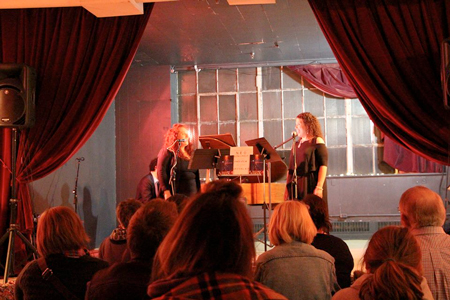by Daniel Hathaway

There was a crowd of about sixty gallery-goers milling about in the third-floor Survival Kit gallery, many sipping on wine and beer, as the nine o’clock hour approached. CCS music director Steven Smith called the event to order, and perhaps because there were no chairs, some potential audience members opted out. That left an audience of about forty with two options: to sit on the floor or stand in the back to hear the hour-long program.
The selections included amplified, twentieth-century vocal music in a variety of styles, ranging in age from Morton Feldman’s Only (1947) to Keegan Meuris’s Far from the Tree (2013). Because ClevelandClassical received the program from the performers in advance, we had the advantage of knowing what was being performed. The audience had no printed programs and announcements were few and far between, so they were mostly left guessing.
Elk led off with an arresting performance of Only, a setting of a Rilke poem Feldman made when he was 21 years old. Then Elk and Fletcher launched into John Cage’s Ear for Ear (1983), a quasi-improvisatory piece the composer originally intended to be performed by one onstage and one offstage singer (or chorus). The audience was engaged and amused.
Akron composer Stephen T. Griebling’s Three Songs from ‘The Lamp and the Bell’ on poems by Edna St. Vincent Millay were attractive and lyrical. Ricky Ian Gordon’s Summer (2002), on the composer’s own poem, provided an expressive duet for Elk and Fletcher. Meredith Monk’s babbly Lullaby (sung by Elk) supplied some cover music while volunteers passed out information sheets inviting the audience to join in Pauline Oliveros’s The Witness.
Not as much a composition as a procedural outline, Oliveros gave the participants carte blanche to make sounds of any kind in reaction to “your partner” (i.e. everybody in the space). Last directive: “The piece will end when a state of Deep Listening has been achieved.”
That might have worked better if the directions had been explained rather than printed out. Though some in the audience, spurred on by Elk and Fletcher, joined in, others were happy just to listen (and that was OK with Oliveros, she wrote.) As if on cue, the gallery cat padded into the room near the beginning, looked around, then headed for the exit. Adding strange to strange, and announcing that the next piece would be using the technique of Sprechstimme, Elk and Fletcher sang-spoke — or at times sang-shouted — Meuris’s Far from the Tree.
The program ended with three songs from Philip Glass’s Liquid Days, a cycle composed to lyrics by Paul Simon, Suzanne Vega, David Byrne and Laurie Anderson. “Changing Opinion” (a solo), “Freezing” (a duet) and Liquid Days, Part I (a trio) brought all three singers into play — along with pianist Lorenzo Salvagni, who might have needed some physical therapy after Glass’s tendon-twisting repetitions. Probably the most gripping pieces on the program, they were skillfully sung and played. Here, the lack of printed texts was most keenly felt.
This interesting opening concert could have made even more of a splash with some well-crafted narration that set the scene for each of the pieces. And not to harp yet again on the lack of programs, but having the whole roster of events for NEOSonic’s five concerts in hand might have moved some of Friday evening’s attendees to come back for more during the next week.
Photo by Rich Rinehart, NEOSonicFest.
Published on ClevelandClassical.com March 21, 2015.
Click here for a printable copy of this article



